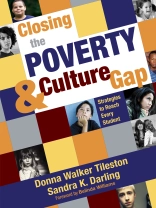‘I can get future teachers to appreciate the role of culture and poverty, but it is very hard for them to translate that understanding into specific activities or strategies. This book provides so much more than any other text that I have ever used in an Introduction to Education course regarding working with diverse populations.’
—Rosemary Traoré, Assistant Professor of Urban Education
University of North Carolina at Charlotte
‘Provides a rich collection of research for instructional strategies. The combination of a call to action and supporting strategies provides a tool kit for instructional leaders.’
—Mary Reeve, Director, Services for Exceptional Students
Gallup Mc Kinley County Schools, NM
Use instructional practices that lead students of poverty and diverse cultures to success!
Many caring teachers have expressed a need for more help in improving student achievement, especially in low-performing/high-poverty schools. This research-based book offers a comprehensive set of instructional strategies that have been proven to make a significant difference in student learning when diverse cultures and poverty come into play.
Donna Walker Tileston and Sandra K. Darling provide a six-part framework to help teachers build on students′ assets and strengths rather than attempt to overcome perceived disadvantages. Based on their extensive experience and gathered data, the authors discuss:
- Why some cultures are ‘turned off’ by typical motivational approaches and what educators can do to reach students
- What research says about the brain′s desire to learn
- How teachers can build on students′ prior knowledge and help forge new connections
- The importance of resiliency, especially for students of poverty and diverse cultures
- Teaching procedural and declarative knowledge and preparing students for high-stakes tests
This practical resource provides the key structures for working effectively with students of differing cultures and poverty, ensuring higher student achievement in the diverse classroom.
Table des matières
Foreword by Belinda Williams
Acknowledgments
About the Authors
Introduction
1. Culture and Poverty
2. Motivation From Within
3. Resiliency: Why It Matters
4. Teaching Declarative Knowledge
5. Teaching Procedural Knowledge (or Process)
6. The Role of Leadership in the Poverty School
7. Closing the Achievement Gaps
References
Index
A propos de l’auteur
Sandra K. Darling is the founder and president of Learning Bridges. Grounded in five years of research, the Learning Bridges Aligned Instructional Database contains the most effective, research-based instructional strategies for the standards of all states—ranked in order of their power to impact learning. Born into extreme poverty in rural Minnesota, Darling understands the power of having significant adults in her life who believed in her, held high expectations, and taught her the value of integrity. She has co-authored three books in education and published articles in several education journals. She has presented on standards-based education, curriculum alignment, inclusion practices, transformational leadership, school improvement, strategic planning, and assessment practices to thousands of educators. She is the leading expert on aligning instructional strategies to content standards and delivering that instruction with the modifications to close the gap in achievement for diverse learners, i.e., students from poverty, diverse cultures, and English language learners. She received her BS degree, three master’s degrees, and her Ph D from the University of Minnesota in related areas of education.












